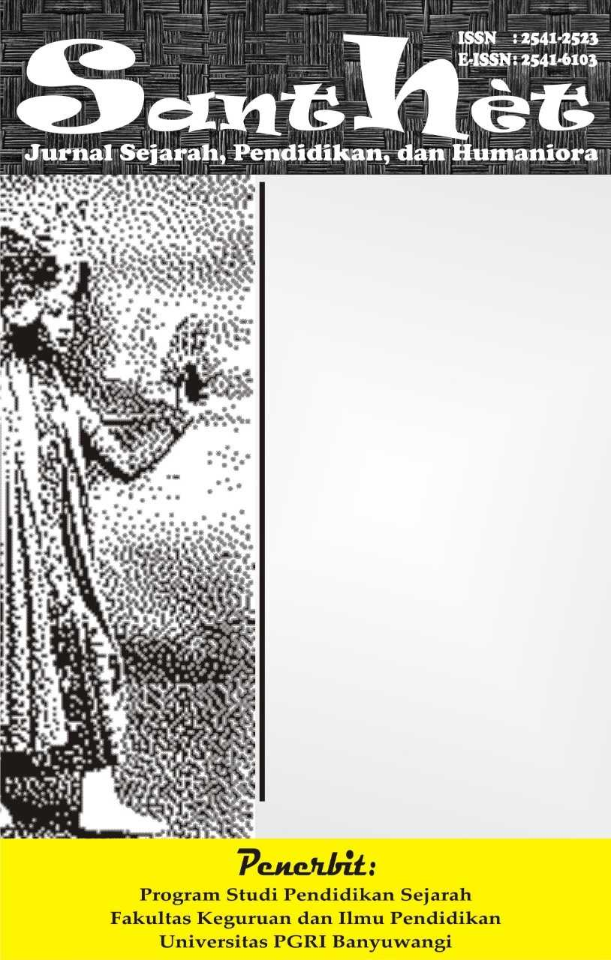Students’ Perception of Learning Vocabulary Through Duolingo Application: The Case of Secondary School in Banyuwangi
DOI:
https://doi.org/10.36526/santhet.v8i2.4134Keywords:
Students’ Perceptions, Duolingo Application, VocabularyAbstract
Duolingo is an interesting English learning application and solution if you want to learn English vocabulary independently. And this is a gamification application, which means users can learn English by playing games because this application uses audio visuals when learning. The aim of this research are to determine the perception of foreign language English (EFL) in using the Duolingo application in vocabulary learning, and to provide students experience and motivation when interacting with Duolingo. This research design uses a qualitative research design with a descriptive analysis approach. Participants in this research were 21 students in class XII A of Madrasah Aliyah Nahdatul Wathan for the 2024 ⁄ 2025 academic year. To collect research data, questionnaires and interviews were conduct 10 students. When conducting observations at schools, researchers found obstacles, namely a lack of interest and motivation when learning English and they had never previously studied English through applications. Based on this situation, researchers used the Duolingo application as a learning medium that students can use to develop a diverse English vocabulary. The research results show that using the Duolingo application in class XII A can give them opportunity to learn English in a fun way and provide a unique experience when learning vocabulary through the Duolingo application. Most students give positive perceptions when learning vocabulary through the Duolingo application.
References
Anisa Dwi Tiara, M. Arinal Rahman, Ciptro Handrianto. 2021. “The Students Perception about Use of Duolingo Application for Improving English Vocabulary.” International Journal of Education, Information Technology and Others (IJEIT) 4(4).
Anton Adi Purwanto, and Syafryadin. 2023. “Students’ Perception on Using Duolingo for Learning English Vocabulary.” JET (Journal of English Teaching) 9(1).
Aulia, Husnur Rosyidah, Eka Wahjuningsih, and Rika Andayani. 2020. “EFFECT OF DUOLINGO APPLICATION ON STUDENTS’ ENGLISH VOCABULARY MASTERY.” ELTR Journal 4(2).
Baxter, Pamela, Susan Jack, and Susan Jack. 2008. “Qualitative Case Study Methodology: Study Design and Implementation for Novice Researchers.” The Qualitative Report Volume 13(4).
Boy Jon, Roi, Rahimah Embong, Bambang Purnama, and Ari Safar Wadi. 2021. “The Challenges of English Language Teaching in Indonesia.” International Journal of English and Applied Linguistics (IJEAL) 1(3).
Elyas, Tariq, and Ibrahim Alfaki. 2014. “Teaching Vocabulary: The Relationship between Techniques of Teaching and Strategies of Learning New Vocabulary Items.” English Language Teaching 7(10).
Inayah, Nurul, Qismullah Yusuf, and Nurul Fibula. 2020. “EXPLORING UNDERGRADUATE STUDENTS’ PERCEPTION TOWARD THE USE OF DUOLINGO IN LEARNING ENGLISH.” Humanities & Social Sciences Reviews 8(3).
Jaelani, Alan, and Dilla Rachmadanti Sutari. 2020. “Students’ Perception of Using Duolingo Application as A Media in Learning Vocabulary.” In: Bogor English Student and Teacher (BEST) conference 2.
Putra, Erlangga. 2020. “The Importance of Learning English Nowadays.” Sepuluh Nopember Institute of Technology (ITS), Surabaya, Indonesia (November).
Tawali, Tawali. 2018. “THE EFFECT OF DEFINITIONS TOWARD STUDENTS’ VOCABULARY.” Journal of Languages and Language Teaching 6(1).
Twum, Rosemary. 2017. “Utilization of Smartphones in Science Teaching and Learning in Selected Universities in Ghana.” Journal of Education and Practice 8(7).





























